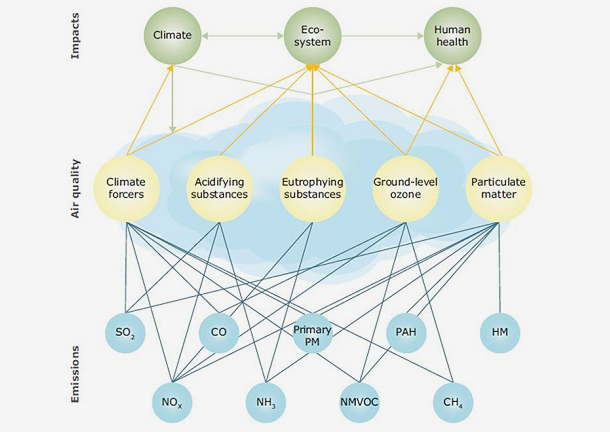Europe’s cities suffer from harmful air pollution

Almost all European city dwellers are exposed to pollutants at levels deemed unsafe by the World Health Organisation (WHO) – more than 95 % are exposed to unsafe levels of some types. New annual report by European Environment Agency (EEA) reveals as many as nine in ten European city dwellers breathe air high in pollutants.
According to an analysis of data from almost 400 cities, air pollution remains the top environmental cause of premature death in urban Europe. Heart disease and stroke are the most common causes (80 %) of death due to air pollution, followed by lung diseases and cancer. Globally, it causes some 1.3 million deaths in cities every year. Nearly a quarter of a million of these deaths are caused by lung cancer.
.png)
Urban population exposed to air pollutant concentrations above selected limit and target value. (Credit: EEA)
Based on 2011 concentrations and population data, an estimated 458,000 deaths in 40 countries in Europe, or 430,000 in the 28 EU member states are caused by air pollution every year. Last year, the WHO said outdoor air pollution was a leading cause of cancer. Scientists believe that air pollutants may be more harmful than previously thought. Air pollution's effect on respiratory illnesses and heart disease is well known, but new studies have shown that it can also affect health in other ways, from foetal development to illnesses late in life.
Alongside health, these pollutants also have a significant effect on plant life and ecosystems. These problems, including eutrophication, acidification and plant damage, have decreased in recent years.
The effect of air pollution on health has also considerable economic impacts, cutting lives short, increasing medical costs and reducing productivity through working days lost across the economy. Direct economic damage includes 15 billion euros from workdays lost, and four billion euros in healthcare costs. Last year, the European Comission estimated the damage costs of air pollution's health impacts in 2010 at 330-940 billion euros ($413 billion to $1.2 trillion).
The most dangerous pollutant was fine particulate matter (PM), caused mainly by burning fossil fuels. Particulate matter pollution can cause or aggravate existing cardiovascular and respiratory diseases, and long-term exposure can contribute to heart attacks and arrhythmias, nerve problems and premature death in some cases. The report said particulate matter and ozone had declined slightly over the last decade, though levels of nitrogen dioxide, mainly from car emissions, did not fall as fast as expected.
.png)
PM2.5 emissions and projections. (Credit: EEA)
PM10, particulate matter measuring less than 10 microns, or 10 millionths of a metre, can lodge in the airways, causing respiratory problems. More perilous still are smaller PM2.5 particles which can enter the lungs and even the bloodstream. According to the report, 10-14 % of city dwellers in the EU are exposed to PM2.5 levels above the EU target. This increases to 91-93 % if WHO guidelines are used.
A hydrocarbon called benzo(a)pyrene (BaP) is the fastest growing pollutant . It s increasing by more than a fifth between 2003 and 2012 as use of woodstoves and biomass heating in cities increased.

Main air pollutants – emissions, air quality and impacts. (Credit: EEA)
According to the WHO, Iran, India, Indonesia and China are among the countries hardest hit by air pollution. While the current levels in Europe pose a significant risk to health, peak levels can be up to 4-5 times higher in Asian cities like Beijing. Last year, Beijing registered PM2.5 levels as high as 40 times WHO recommended limits.
Featured image credit: EEA/Ian Buchanan

Commenting rules and guidelines
We value the thoughts and opinions of our readers and welcome healthy discussions on our website. In order to maintain a respectful and positive community, we ask that all commenters follow these rules:
We reserve the right to remove any comments that violate these rules. By commenting on our website, you agree to abide by these guidelines. Thank you for helping to create a positive and welcoming environment for all.